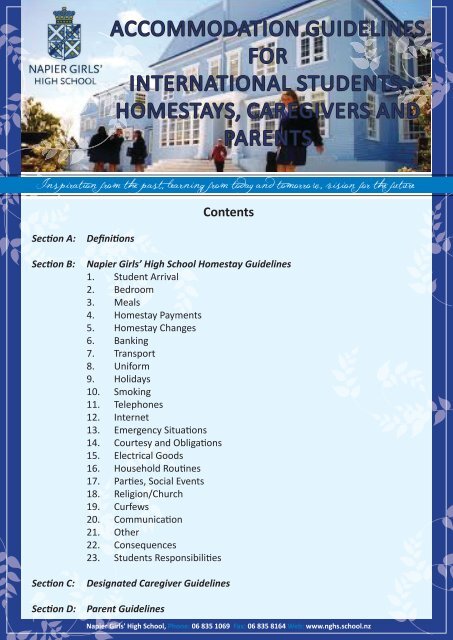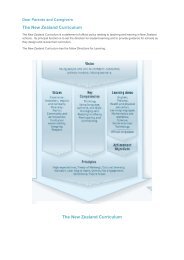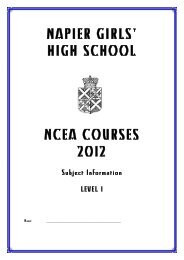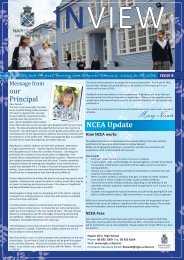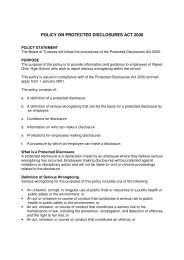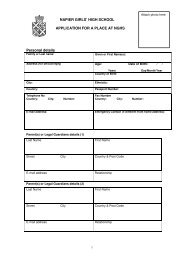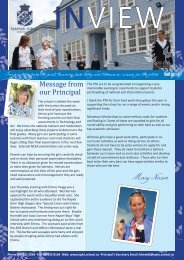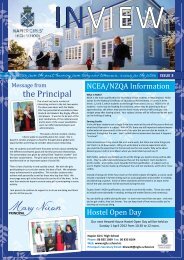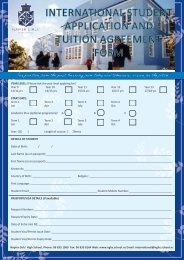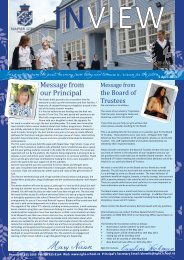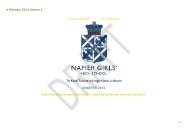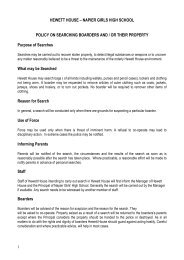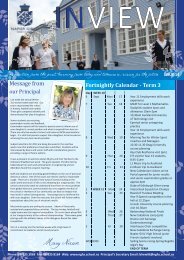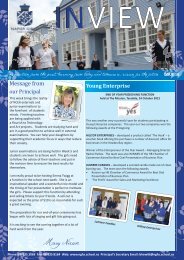ACCOMMODATION GUIDELINES FOR ... - nghs.school.nz
ACCOMMODATION GUIDELINES FOR ... - nghs.school.nz
ACCOMMODATION GUIDELINES FOR ... - nghs.school.nz
Create successful ePaper yourself
Turn your PDF publications into a flip-book with our unique Google optimized e-Paper software.
<strong>ACCOMMODATION</strong> <strong>GUIDELINES</strong><strong>FOR</strong>INTERNATIONAL STUDENTS,HOMESTAYS, CAREGIVERS ANDPARENTSInspiration from the past, learning from today and tomorrow, vision for the futureContentsSection A:Section B:Section C:Section D:DefinitionsNapier Girls’ High School Homestay Guidelines1. Student Arrival2. Bedroom3. Meals4. Homestay Payments5. Homestay Changes6. Banking7. Transport8. Uniform9. Holidays10. Smoking11. Telephones12. Internet13. Emergency Situations14. Courtesy and Obligations15. Electrical Goods16. Household Routines17. Parties, Social Events18. Religion/Church19. Curfews20. Communication21. Other22. Consequences23. Students ResponsibilitiesDesignated Caregiver GuidelinesParent GuidelinesNapier Girls' High School, Phone: 06 835 1069 Fax: 06 835 8164 Web: www.<strong>nghs</strong>.<strong>school</strong>.<strong>nz</strong>
SECTION A – DEFINITIONS (as per the Code of Practice)What is a Homestay?“Homestay” means accommodation provided to an international student in the residence of a family orhousehold where no more than four international students are accommodated.What is a Designated Care Giver (DCG)?“DCG” means a relative or close family friend designated in writing by the parents of an international studentas the caregiver and accommodation provider for that student, but does not include establishment owner,manager, or employee.What is a Parent?“Parent” means the father or mother of an international student, and includes court appointed guardians.SECTION B - HOMESTAY <strong>GUIDELINES</strong>If you are a caregiver, thank you for agreeing to share your home and family with an International student.You (and they) will find it challenging and frustrating at times, but ultimately we hope you find it rewardingand fulfilling and you have a life-long extended family member. If you are a student we hope you settleeasily into your homestay and we will do our best to help you make that happen.These guidelines have been developed from guidelines used by other <strong>school</strong>s for many years and shouldform the basis of discussion between the host family and the student. We recommend that you discuss theseissues in the first week to avoid future conflict.1. STUDENT ARRIVALWhen we place a student we will advise of the student’s course start date, duration and any student detailsavailable to us.The student will be delivered to your home by a member of our staff.2. BEDROOMStudents need to have their own bedroom and their own bed with all bed linen provided. This is theirsanctuary when they need to be alone, so please make sure your children do not intrude. Each room needs achest of drawers and a wardrobe supplied by the host family. A chair and a large desk with good lighting forhomework are also required for the student to study.A heater is required as most cultures find our houses cold and under heated. Please be clear how to turn itoff and when to use it.All teenagers of all cultures struggle to have a clean and tidy room, so please be realistic and make yourexpectations clear.3. MEALS• Monday to Friday – provided are breakfast, a cut lunch (choice of fillings) or similar, after <strong>school</strong> snacksand an evening meal. Be clear with ‘house’ rules e.g. fruit consumption. Discuss what they like/dislike.• Saturday and Sunday – provided are breakfast, lunch, an evening meal and snacks as per normal familyarrangements.• As the student is a part of your family they must have access to the same food as your family.• If a student is taken out for lunch or dinner (McDonalds, etc.) it should be treated as a meal at home andpaid for by the host. If a student chooses to go out for lunch or dinner with their own friends, it is thestudent who pays.• Teenagers often have “hollow legs” and can eat quite large amounts. Weetbix, rice and whole meal breadhelp.
• It may be possible for a student to have their own line and contract for internet usage.• Internet is available to all international students at Napier Girls’ High School in the library and in somespecific classrooms. It is also available at the <strong>school</strong> hostel, Hewett House.13. EMERGENCY SITUATIONS• Please inform the <strong>school</strong> office on (06) 835 1069 or the International Dean on (06) 835 1069 extn 715 by9am if yout student is ill and will be absent from <strong>school</strong>.• International students should be taken to the host’s own doctor in cases of illness.• International students should be taken to the nearest hospital or emergency clinic in an emergency.• International students are advised they should always carry their insurance card in their wallets.• International students must have appropriate and current medical and travel insurance while studyingin New Zealand. Students needing medical assistance need to pay for their own treatment at time oftreatment (not host parents) and claim for the expenses later through the international office.• Most international students are not entitled to publicly funded health services while in New Zealand.Full details on entitlements to publicly funded health services are available through the Ministry ofHealth, and can be viewed on their website at http://www.moh.govt.<strong>nz</strong>.• The Accident Compensation Corporation provides accident insurance for all New Zealand citizens,residents and temporary visitors to New Zealand, but students may still be liable for all other medicaland related costs. Further information can be viewed on the ACC website at http://www.acc.co.<strong>nz</strong>.14. COURTESY AND OBLIGATIONS• Students must negotiate with the host parent in advance about whether they will or will not be homefor a meal.• Students must discuss with the host parent about where they are going (address) and what time theywill be home and leave a contact number or leave their mobile phone switched on (in case of urgentmessages). Mobile phone contact only is good enough.• No student is allowed to stay away from the host family home overnight without the consent of thehost family.15. ELECTRICAL GOODS• New Zealand electricity is 240 volts so students may need to use transformers on any electricalappliances they bring here. Please check this carefully BE<strong>FOR</strong>E they plug anything in.16. HOUSEHOLD ROUTINES• As a member of the family, students should assist with some minimal household tasks if asked to do so.If the New Zealand children help around the house, so should the student.• Laundry is usually done by the hosts. Make sure the student knows the family routine regarding sheets,towels, etc.• Some students prefer to do their own laundry, but please ensure that they know how to use themachines and where to hang their washing.• Many girls will be modest about drying underwear on the clothesline.• Please explain where rubbish can be put, including the disposal of sanitary materials.• The student and the host need to discuss how the family greets, says good night, etc. This may includea simple kiss on the cheek or a hug.• Electricity is expensive in New Zealand and students may be completely unaware of the impact theycould have on the electricity account. Hot water is usually electrically heated and stored in small tanks,so please advise students to spend only 5 to 8 minutes for their daily shower.• Host families have to explain how the shower and other facilities work, and how they would like theirbathrooms left.
17. PARTIES, SOCIAL EVENTSThe student is expected to be included in all host family social events and the “Kiwi” experience:• The <strong>school</strong> expects homestay families to provide regular family activities and experiences outside thehome in the student’s leisure hours.• It is important that our international visitors have a wide range of experiences so they get a feel for ourculture. The more family and other activities you can involve them in the better and their English willimprove at the same time.• Co-Curricular Activities: Our <strong>school</strong> requires all International students to be involved in at least onesporting, musical or other cultural co-curricular activity. These are often held outside normal <strong>school</strong>hours. Your assistance with transport to/from this activity is much appreciated.• The student is not permitted to buy or consume alcohol. Homestay supervision is required at any eventwhere alcohol is available.• Homestay supervision is required at any parties the student may hold e.g. a birthday party.• School Trips: The International Dean tries to schedule at least one group trip each term - a ‘Kiwi DayOut’. These are usually held at weekends and include a wide range of Hawkes Bay attractions, such asan orchard tour, Ocean Beach, the Amazing Maize, Classic Sheepskins, Otatara Pa and Art Deco tours.Longer 3-4 day trips to Wellington, Auckland and Rotorua are possible for those students who are notentered for NCEA. Please contact the International Dean for further information.18. RELIGION/CHURCHStudents come from many cultures and religions and this should be respected. It is often very difficult andembarrassing for students to say ‘no’ when pressed to attend a church that is not their belief.19. CURFEWS• Students under the age of 16 are not allowed out unless accompanied by the host family or someoneapproved by the host family. The host has to always check who the ‘responsible adult’ is and that theyare, in fact, aware of that responsibility (and that they are aware of the outing). The host may need todrop off and pick up if necessary.• Students should be home before midnight, but there are times at weekends when students aged 16 and17 will want to be out at parties or with friends, sometimes after midnight. This needs to be specificallyarranged beforehand, with details checked.• Students aged 18 still need to have approval of their caregiver as to where they are going, with whomand how they will get home and by when.20. COMMUNICATION• Your student will require understanding and encouragement as she struggles to make herselfunderstood in English. It would help if you speak slowly, clearly and wait a time for a reply. If shestill does not understand, use different words, use gestures, write it down in simple English or drawpictures. Communication will improve with time, patience and.... a sense of humour!• If you have any concerns about your student, please discuss the matter with our International Dean.Difficulties caused by cultural differences can often be put right after discussion with everyoneconcerned.• If your circumstances change and having a student in your home is causing stress, please advise the<strong>school</strong>. We do not want you to feel obliged to persevere in a situation from which no-one is benefiting.21. OTHER• A student attending Napier Girls’ High School must abide by the starting and finishing times of the<strong>school</strong>, which are 8.40 am to 3.15 pm.• They must also follow all the <strong>school</strong> rules.• Please read the <strong>school</strong> newsletter so you are aware of holidays, etc. These newsletters are sent regularlyby email. Please inform the International Dean if you require hard copies of these newsletters.
• Most students are in New Zealand to complete their education, not to develop their social lives. Checkthe goals of the student when they arrive. A short-term student has different expectations than along-term student. Set up regular contact with the student’s parents or agent. Students should be ableto have fun while still attempting homework, assignments and exams. Please encourage regular andsteady homework habits and don’t be afraid to ask what they are doing at <strong>school</strong> / for homework etc.• New Zealand families go to bed quite early, often around 10 pm. A student is expected to have theirlights out by midnight, so they can easily get up the next day for <strong>school</strong>.22. CONSEQUENCESStudents who are not abiding by the <strong>school</strong> rules will be dealt with as follows:Student disciplinary procedures in the event of unsatisfactory performance/behaviour:• Daily/weekly report to the International Dean• Written and verbal warnings may be given to the student. A student may have their student visarevoked if the situation does not improve.• A student may be asked to return home in serious situations – for example:1. Illegal activities (drugs, shoplifting, theft)2. Violence and aggression3. Habitual truancy4. Bullying5. Emotional imbalance6. Dishonesty/untrustworthiness7. Inability/unwillingness to comply with <strong>school</strong> and homestay rules.8. Inappropriate and unsafe social behavior.23. STUDENTS ARE RESPONSIBLE <strong>FOR</strong>• Stationery / Workbooks costs• Any luxury cosmetic items, personal toiletries• Personal pocket money and personal expenses• Bus fares• Exam fees• Holiday costs• Medical/dental expenses• Personal telephone accounts• Uniforms• Losses and theft of student property (A police report may be necessary for insurance.)• School tripsParents and students have signed a contract agreeing to abide by all of the rules and policies.
SECTION C - DESIGNATED CAREGIVER <strong>GUIDELINES</strong>• The student’s parents have placed their child in the host’s care and the <strong>school</strong> has approved of thisplacement. Permission MUST be gained from the School before any changes can be made to thisarrangement.• The parents take full responsibility and accept the decisions made by the designated caregiver (DCG)about the day-to-day requirements of their child and understand that the School will make everyendeavor to provide care and welfare of their child whilst studying at Napier Girls’ High School.• If necessary the <strong>school</strong> may relocate the student to an approved homestay if there are issues that cannotbe resolved between the student and the DCG, with permission from the parents.• Napier Girls’ High School will visit DCG homes on or prior to enrolment in order to meet with andestablish communication arrangements with them. The <strong>school</strong> must ensure that the selectedaccommodation is satisfactory. The <strong>school</strong> will interview the student at least once a term to monitor heron-going well-being and their satisfaction with their living arrangements.• To be approved as a DCG Napier Girls’ High School requires them to undergo police vetting.SECTION D – PARENT <strong>GUIDELINES</strong>• Students living with parents must still be monitored by the School.• The home of a parent may be visited to verify the living situation.• At no time can a parent leave the student unsupervised overnight or for any length of time without firstinforming the School and seeking approval for a temporary adult caregiver to take their place. This willprobably be a designated caregiver that needs to be approved for police vetting purposes.• If students are living with a parent, then the parent has full responsibility for the pastoral care of thestudent outside tuition hours, and may be called to the <strong>school</strong> at short notice on <strong>school</strong> matters.• If a parent caregiver leaves a student unsupervised in New Zealand that student will lose their place atthe School and New Zealand Immigration will be informed. Parents must follow all the policies of theSchool at all times.


